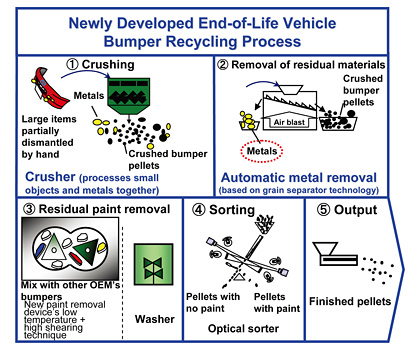NEWS RELEASES
Products and Technology
Mazda Develops World-First Automated Recycling Technology for End-of-Life Vehicle Bumpers
- New recycling process is efficient, compatible with all bumper makes and eliminates the need for separate collection networks -
|
HIROSHIMA, Japan—Mazda Motor Corporation has developed a world-first recycling technology which enhances the process it uses to recycle used bumpers from vehicles, whose useful life has ended, into raw plastic resin for use in new vehicle bumpers. The new technology is the first to enable recycling of used bumpers from different manufacturers at the same time. Additionally, by automating processes to remove metal attachments, it significantly increases recycling efficiency.
Mazda became an industry leader in bumper recycling when it began processing used bumpers from its own end-of-life vehicles that were collected through its dealer network in Japan. The new recycling technology can recycle all types and makes of bumper, thus removing the need for separate collection systems for each automaker’s products. It also combines all the recycling stages involved in crushing used bumpers through to reproducing raw materials, into a single automated process. These innovations represent a significant step forward for the industry.
Until now, unwanted materials such as metal attachments had to be removed by hand before the bumpers were visually inspected. These labor-intensive processes were an obstacle to increasing efficiency. Mazda overcame this by developing technologies to automate the processes in collaboration with Satake Corporation, a company in Hiroshima Prefecture, western Japan. Once used bumpers are crushed into pellets, a machine similar to those used to separate contaminants from cereal grains, removes unwanted metal pieces by shaking the pellets and directing airflow over them. In this way, Mazda’s new process enables higher efficiencies to be achieved.
Mazda’s new technology also resolves another limitation of previous methods. Depending on the vehicle manufacturer and age of the vehicle, used bumpers vary considerably in terms of the composition of polypropylene plastic and the paint’s adhesive properties. While this has forced previous systems to treat different bumpers separately, Mazda’s new technology successfully enables all bumpers to be recycled together. The new process employs a kneading machine which is similar to those used for processing foodstuffs and chemicals such as rubber and plastics. The machine applies a powerful shear force to the crushed bumper pellets, effectively stripping off the paint regardless of the plastic composition or paint properties, and without having to heat the plastic.
Going forward, Mazda will continue to advance development of innovative recycling technologies, including bumper-to-bumper recycling, as it strives towards achieving a sustainable future.
For further information on Mazda’s environmental technologies, please visit:
Automated bumper recycling process
History of Mazda’s bumper recycling technologies
|
